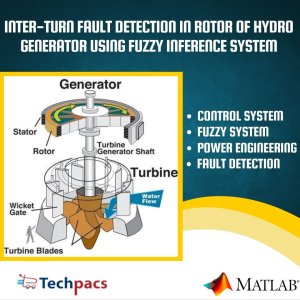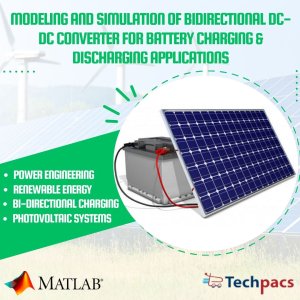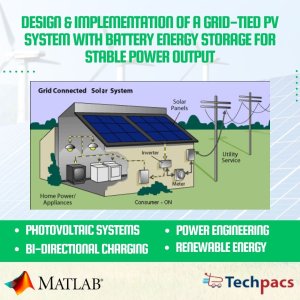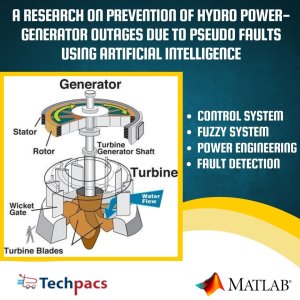Efficient Power Management: Integrating Fuzzy Control and MPPT Algorithm for Solar PV Systems with Wind Energy Conversion
Problem Definition
The literature survey in the field of solar PV systems has revealed a significant focus on developing methods to optimize voltage management and prolong battery lifespan. One recent approach utilized a PI controller in conjunction with a dc-dc boost converter to extract maximum power point tracking (MPPT) and prevent battery overloading. While this strategy showed effective performance, it also exhibited limitations that need to be addressed. The use of a PI controller can lead to high starting overshoot, sensitivity to controller gains, and sluggish response to sudden disturbances. Additionally, the reliance on solar radiation for the system to function effectively poses a challenge in scenarios where bad weather persists for extended periods, thereby hindering power supply.
These limitations underscore the need for further research and development in this domain to address the existing problems and enhance the overall efficiency and reliability of solar PV systems.
Objective
The objective of this project is to address the limitations of existing solar PV systems, such as battery overloading and inefficiency during adverse weather conditions, by proposing a novel model. This new model replaces the conventional PI controller with a fuzzy logic system to prevent overloading and improve accuracy. Additionally, an Increment Conductance MPPT algorithm is introduced to optimize power generation efficiency. Integrating a wind conversion system with the solar PV system creates a hybrid model that ensures continuous power supply regardless of weather conditions. The aim is to enhance the overall performance, reliability, and efficiency of renewable energy systems by combining these technologies.
Proposed Work
In this project, the existing problem of battery overloading and the inefficiency of solar PV systems in adverse weather conditions are addressed by proposing a novel model. The conventional PI controller is replaced by a fuzzy logic system to prevent overloading and provide more accurate results. Fuzzy logic, being an intelligent technique that incorporates human intuition and experience, is expected to enhance the overall performance of the system. Additionally, an Increment Conductance MPPT algorithm is introduced to optimize the power generation efficiency of the solar PV system. To further improve the reliability and effectiveness of the system, a wind conversion system is integrated with the solar PV system to create a hybrid model.
This hybrid model utilizes both solar and wind energy to ensure a continuous power supply, regardless of the weather conditions. By combining these technologies, the proposed work aims to overcome the shortcomings of traditional models and create a more efficient and reliable renewable energy system.
Application Area for Industry
This project's proposed solutions can be applied in various industrial sectors such as renewable energy, power generation, and off-grid applications. The fuzzy logic system replacing the traditional PI controller addresses the challenges of high starting overshoot, controller gains sensitivity, and sluggish response to sudden disturbances. By combining solar PV and wind energy systems in a hybrid model, the output becomes more reliable and efficient, regardless of the weather conditions. This approach not only maximizes energy production during the day when sunlight is available but also ensures continuous power generation at night through wind energy. Industries can benefit from reduced dependence on grid power, improved energy efficiency, and the ability to adapt to seasonal changes in energy demand.
Application Area for Academics
The proposed project has the potential to enrich academic research, education, and training in the field of renewable energy systems. By introducing a novel model that replaces the traditional PI controller with a fuzzy logic system, the project aims to overcome the drawbacks of existing models and increase the reliability and efficiency of solar PV systems. This innovative approach can pave the way for exploring new research methods, simulations, and data analysis techniques within educational settings.
The relevance of this project lies in its application to solve the problem of battery overloading and voltage management in solar PV systems, particularly in regions with fluctuating weather conditions. By combining solar and wind energy sources in a hybrid model, the system can maintain a consistent output throughout the day and night, making it more reliable and sustainable.
Researchers, MTech students, and PhD scholars in the field of renewable energy systems can benefit from the code and literature of this project to further their research and explore innovative solutions to energy challenges.
The use of fuzzy logic algorithms in this project opens up possibilities for exploring intelligent control techniques in renewable energy systems. By incorporating wind energy alongside solar PV systems, the project addresses the limitations of relying solely on sunlight for power generation. This interdisciplinary approach can facilitate collaboration between researchers from different domains and contribute to the development of advanced energy solutions.
In terms of future scope, the project can be extended to include other renewable energy sources or incorporate advanced control strategies for optimal energy management.
By leveraging the capabilities of fuzzy logic and hybrid energy systems, researchers can explore new avenues for enhancing the efficiency and sustainability of renewable energy technologies. The project's potential applications in academic research, education, and training make it a valuable resource for advancing knowledge in the field of renewable energy systems.
Algorithms Used
In the proposed work, fuzzy logic is utilized to replace the traditional PI controller in order to prevent overloading and enhance the reliability and effectiveness of the system. Fuzzy logic, a mathematical and intelligent technique, incorporates human intuition and experience to provide accurate and efficient results. By integrating fuzzy logic with a wind conversion system into a hybrid model, the system can effectively balance output fluctuations and account for seasonal changes in energy production. This combination of solar PV and wind energy sources ensures a more reliable and efficient energy production system that can operate continuously regardless of weather conditions.
Keywords
SEO-optimized keywords: Fuzzy Control System, Battery Protection, Overloading Prevention, Incremental Conductance Maximum Power Point Tracking, MPPT Algorithm, Solar PV System, Wind Energy, Hybrid Model, Power Generation Efficiency, Renewable Energy, Sustainable Energy, Weather Adaptation, Energy Management, Hybrid Power System, Power Electronics, Energy Conversion, Renewable Energy Integration, Energy Efficiency, Power Generation.
SEO Tags
Fuzzy Control System, Battery Protection, Overloading Prevention, Incremental Conductance Maximum Power Point Tracking, MPPT Algorithm, Solar PV System, Wind Energy, Hybrid Model, Power Generation Efficiency, Renewable Energy, Sustainable Energy, Weather Adaptation, Energy Management, Hybrid Power System, Power Electronics, Energy Conversion, Renewable Energy Integration, Energy Efficiency, Power Generation
| Shipping Cost |
|
No reviews found!

















































No comments found for this product. Be the first to comment!